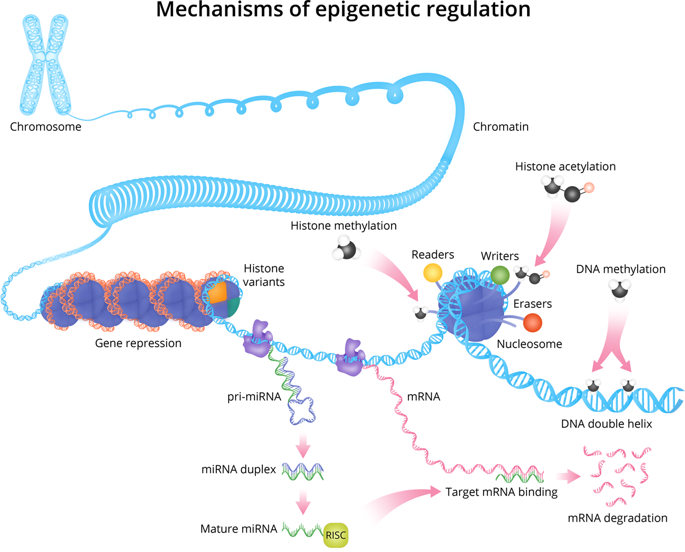当前位置:
X-MOL 学术
›
Mol. Psychiatry
›
论文详情
Our official English website, www.x-mol.net, welcomes your
feedback! (Note: you will need to create a separate account there.)
Epigenetic mechanisms in schizophrenia and other psychotic disorders: a systematic review of empirical human findings.
Molecular Psychiatry ( IF 9.6 ) Pub Date : 2020-01-06 , DOI: 10.1038/s41380-019-0601-3 Lukasz Smigielski 1, 2 , Vinita Jagannath 1, 3 , Wulf Rössler 2, 4, 5, 6 , Susanne Walitza 1, 2, 7, 8 , Edna Grünblatt 1, 7, 8
Molecular Psychiatry ( IF 9.6 ) Pub Date : 2020-01-06 , DOI: 10.1038/s41380-019-0601-3 Lukasz Smigielski 1, 2 , Vinita Jagannath 1, 3 , Wulf Rössler 2, 4, 5, 6 , Susanne Walitza 1, 2, 7, 8 , Edna Grünblatt 1, 7, 8
Affiliation

|
Schizophrenia and other psychotic disorders are highly debilitating psychiatric conditions that lack a clear etiology and exhibit polygenic inheritance underlain by pleiotropic genes. The prevailing explanation points to the interplay between predisposing genes and environmental exposure. Accumulated evidence suggests that epigenetic regulation of the genome may mediate dynamic gene-environment interactions at the molecular level by modulating the expression of psychiatric phenotypes through transcription factors. This systematic review summarizes the current knowledge linking schizophrenia and other psychotic disorders to epigenetics, based on PubMed and Web of Science database searches conducted according to the PRISMA guidelines. Three groups of mechanisms in case-control studies of human tissue (i.e., postmortem brain and bio-fluids) were considered: DNA methylation, histone modifications, and non-coding miRNAs. From the initial pool of 3,204 records, 152 studies met our inclusion criteria (11,815/11,528, 233/219, and 2,091/1,827 cases/controls for each group, respectively). Many of the findings revealed associations with epigenetic modulations of genes regulating neurotransmission, neurodevelopment, and immune function, as well as differential miRNA expression (e.g., upregulated miR-34a, miR-7, and miR-181b). Overall, actual evidence moderately supports an association between epigenetics and schizophrenia and other psychotic disorders. However, heterogeneous results and cross-tissue extrapolations call for future work. Integrating epigenetics into systems biology may critically enhance research on psychosis and thus our understanding of the disorder. This may have implications for psychiatry in risk stratification, early recognition, diagnostics, precision medicine, and other interventional approaches targeting epigenetic fingerprints.
中文翻译:

精神分裂症和其他精神病的表观遗传机制:对人类经验发现的系统评价。
精神分裂症和其他精神病是高度衰弱的精神疾病,缺乏明确的病因,并表现出多效基因的多基因遗传。普遍的解释指向易感基因和环境暴露之间的相互作用。积累的证据表明,基因组的表观遗传调控可能通过转录因子调节精神病学表型的表达,在分子水平上介导动态基因-环境相互作用。这篇系统综述总结了当前将精神分裂症和其他精神病与表观遗传学联系起来的知识,基于 PubMed 和根据 PRISMA 指南进行的 Web of Science 数据库搜索。人体组织病例对照研究中的三组机制(即,死后脑和生物体液)被考虑在内:DNA甲基化、组蛋白修饰和非编码miRNA。从最初的 3,204 条记录库中,152 项研究符合我们的纳入标准(每组分别为 11,815/11,528、233/219 和 2,091/1,827 例病例/对照)。许多研究结果揭示了与调节神经传递、神经发育和免疫功能的基因的表观遗传调节以及差异 miRNA 表达(例如,上调的 miR-34a、miR-7 和 miR-181b)相关。总体而言,实际证据适度支持表观遗传学与精神分裂症和其他精神病之间的关联。然而,异质的结果和跨组织的推断需要未来的工作。将表观遗传学整合到系统生物学中可能会极大地增强对精神病的研究,从而增强我们对这种疾病的理解。这可能对精神病学在风险分层、早期识别、诊断、精准医学和其他针对表观遗传指纹的干预方法方面产生影响。
更新日期:2020-01-06
中文翻译:

精神分裂症和其他精神病的表观遗传机制:对人类经验发现的系统评价。
精神分裂症和其他精神病是高度衰弱的精神疾病,缺乏明确的病因,并表现出多效基因的多基因遗传。普遍的解释指向易感基因和环境暴露之间的相互作用。积累的证据表明,基因组的表观遗传调控可能通过转录因子调节精神病学表型的表达,在分子水平上介导动态基因-环境相互作用。这篇系统综述总结了当前将精神分裂症和其他精神病与表观遗传学联系起来的知识,基于 PubMed 和根据 PRISMA 指南进行的 Web of Science 数据库搜索。人体组织病例对照研究中的三组机制(即,死后脑和生物体液)被考虑在内:DNA甲基化、组蛋白修饰和非编码miRNA。从最初的 3,204 条记录库中,152 项研究符合我们的纳入标准(每组分别为 11,815/11,528、233/219 和 2,091/1,827 例病例/对照)。许多研究结果揭示了与调节神经传递、神经发育和免疫功能的基因的表观遗传调节以及差异 miRNA 表达(例如,上调的 miR-34a、miR-7 和 miR-181b)相关。总体而言,实际证据适度支持表观遗传学与精神分裂症和其他精神病之间的关联。然而,异质的结果和跨组织的推断需要未来的工作。将表观遗传学整合到系统生物学中可能会极大地增强对精神病的研究,从而增强我们对这种疾病的理解。这可能对精神病学在风险分层、早期识别、诊断、精准医学和其他针对表观遗传指纹的干预方法方面产生影响。











































 京公网安备 11010802027423号
京公网安备 11010802027423号